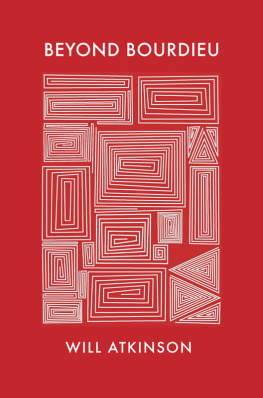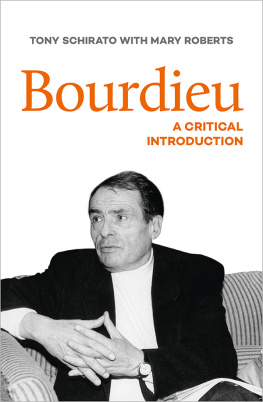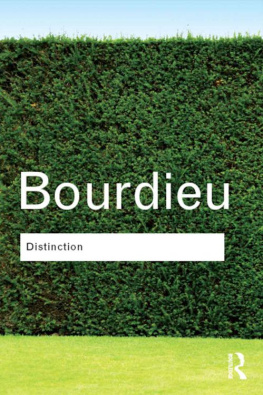
For Phoebe and Vikki
Copyright page
Copyright Will Atkinson 2016
The right of Will Atkinson to be identified as Author of this Work has been asserted in accordance with the UK Copyright, Designs and Patents Act 1988.
First published in 2016 by Polity Press
Polity Press
65 Bridge Street
Cambridge CB2 1UR, UK
Polity Press
350 Main Street
Malden, MA 02148, USA
All rights reserved. Except for the quotation of short passages for the purpose of criticism and review, no part of this publication may be reproduced, stored in a retrieval system, or transmitted, in any form or by any means, electronic, mechanical, photocopying, recording or otherwise, without the prior permission of the publisher.
ISBN-13: 978-1-5095-0748-1
ISBN-13: 978-1-5095-0749-8(pb)
A catalogue record for this book is available from the British Library.
Library of Congress Cataloging-in-Publication Data
Names: Atkinson, Will, 1983- author.
Title: Beyond Bourdieu / Will Atkinson.
Description: Cambridge, UK; Malden, MA : Polity Press, 2016. | Includes bibliographical references and index.
Identifiers: LCCN 2016003544| ISBN 9781509507481 (hardback : alk. paper) | ISBN 9781509507498 (pbk. : alk. paper)
Subjects: LCSH: Bourdieu, Pierre, 19302002. | Sociology.
Classification: LCC HM479.B68 A834 2016 | DDC 301dc23 LC record available at http://lccn.loc.gov/2016003544
Typeset in 11 on 13 pt Sabon
by Toppan Best-set Premedia Limited
Printed and bound in the UK by CPI Group (UK) Ltd, Croydon, CRO 4YY
The publisher has used its best endeavours to ensure that the URLs for external websites referred to in this book are correct and active at the time of going to press. However, the publisher has no responsibility for the websites and can make no guarantee that a site will remain live or that the content is or will remain appropriate.
Every effort has been made to trace all copyright holders, but if any have been inadvertently overlooked the publisher will be pleased to include any necessary credits in any subsequent reprint or edition.
For further information on Polity, visit our website: www.politybooks.com
Acknowledgement
Chapter 3 is a revised and lengthened version of an article originally published as A Sketch of Family as a Field: From Realised Category to Space of Struggle. Acta Sociologica, 57 (3): 22133. I am grateful to Sage Publications for permission to reproduce this material.
After having of necessity divided things up too much, and abstracted from them, the sociologists must strive to reconstitute the whole. By doing so they will discover rewarding facts. They will also find a way to satisfy the psychologists. The latter are strongly aware of their privileged position; the psychopathologists, in particular, are certain they can study the concrete. All these study, or should observe, the behaviour of total beings, not divided according to their faculties. We must imitate them. The study of the concrete, which is the study of completeness, is possible, more captivating, and more explanatory still in sociology.
Marcel Mauss, The Gift
(1954/2002: 103)
Reproduced by permission of Taylor and Francis Books UK
Introduction
There is no doubt about it: Pierre Bourdieu is the single most influential sociologist of the later twentieth century. The concepts which made his name habitus, capital and field, the latter also encompassing his notion of the social space as a national balance sheet of symbolic capital and symbolic power now, well over a decade after his death, pervade not just his own discipline but the full gamut of social sciences and humanities. Rarely does a month go by, it seems, without a book or article exploring their relevance for this or that subject, or this or that social or intellectual problem. Nor are they any longer confined to their European, let alone French, crucible, finding themselves innovatively applied in research from Shanghai to Chicago and given novel spins as new times and different national contexts demand. Some, especially in the US, have built on Bourdieu's general orientation in his later work to champion an all-purpose field theory (see e.g. Fligstein and McAdam, 2011; Green, 2014; Hilgers and Mangez, 2014), while others, fascinated by the ground-breaking statistical techniques he advocated, have sought to map out the social spaces of their respective nations and their homologies in the manner of Distinction, Bourdieu's (1984) magnum opus (e.g. Prieur et al., 2008; Rosenlund, 2009). Still more continue to document and elaborate the process through which cultural capital is reproduced over the generations (e.g. Reay, 1998; Lareau, 2003). Numerous scholars, meanwhile, have dedicated almost their entire careers to clarifying, introducing and extending Bourdieu's theoretical tools no mean feat given their richness, apparent flexibility and dispersion throughout Bourdieu's hefty corpus. In his own terms, then, it seems evident that the spirit and the language of Bourdieu's brand of sociology have come to occupy a somewhat dominant position within the global sociological field, framing research projects and driving debates all across the face of the Earth.
This is not to say the Frenchman is without his critics or doubters, or that all of his concepts have been well understood by even those sympathetic to him. Many, for example, resist his influence on social science on abstract theoretical grounds, if not since, like Marxism before him, his perspective has been perceived as a threat to the cherished ideals of liberal capitalism on raw political principle. His theory has been decried as determinist: the habitus, being nothing but an internalization of social structures, was simply another way of painting people as idiotic judgemental dopes, to use Harold Garfinkel's famous phrase (Alexander, 1995; Ranciere, 2004). It was depicted as obsessed with social reproduction at the expense of social resistance and change: fields shape habitus, habitus shapes fields, and so the cycle continues forever (Jenkins, 2002). And it was labelled as utilitarian in its view of human beings we are all seemingly plotting and scheming to maximize our capitals in any field in a purely instrumental manner (Honneth, 1986) and, at the same time, somewhat overemphatic about the non-conscious, unreflexive, automatic, corporeal nature of practice (Sayer, 2005). Meanwhile even Bourdieu's defenders and appliers have all too often superficially understood and watered down his concepts, combined them with all kinds of antagonistic notions drawn from disparate intellectual sources and subjected them to rounds of critical modification on questionable grounds.
As Bourdieu (1993a, 1997a, 1999a), Wacquant (1993) and others (e.g. Swartz, 1997) frequently lamented, both the enemies and the well-meaning enthusiasts have tended to fall prey to the troublesome allodoxia effect the mistaken reading of one thing as another premised on distance, whether spatial or social, in this instance generated by viewing a body of thought forged in one intellectual field through the lenses and problematics provided by altogether different ones (Bourdieu, 1997a: 451). Hence Bourdieu's theory has often been equated with neo-Marxism, or functionalism, or utilitarianism, and his concepts robbed of their analytical power by being used as little more than fancy synonyms for existing and somewhat vague notions:
Next page







